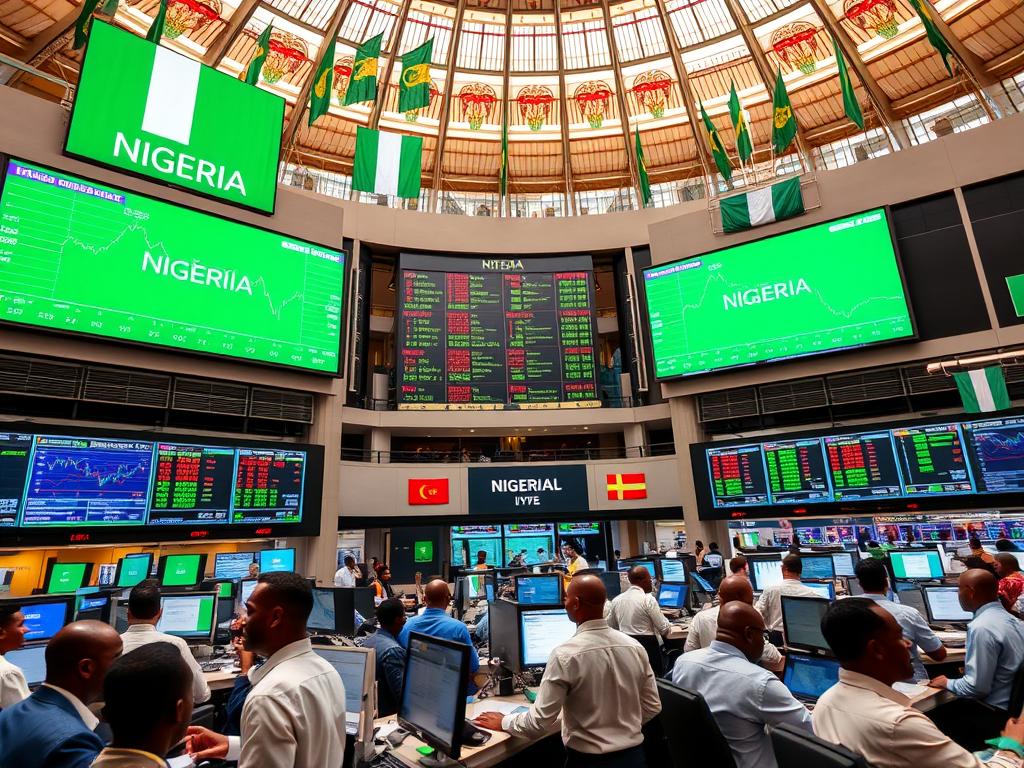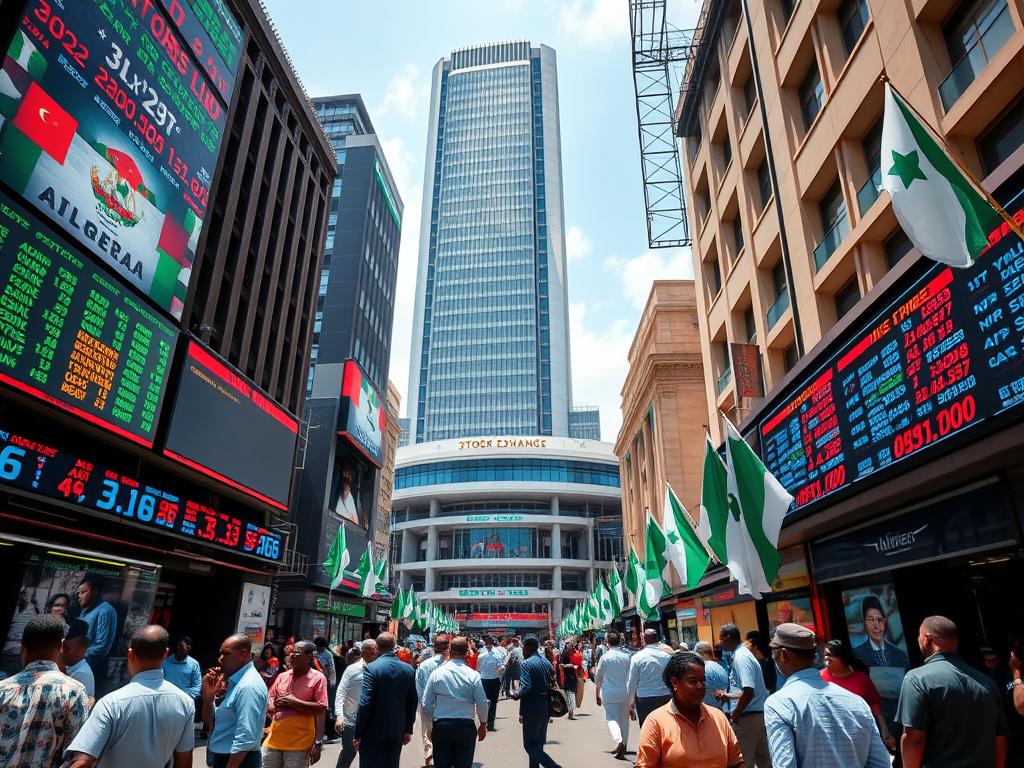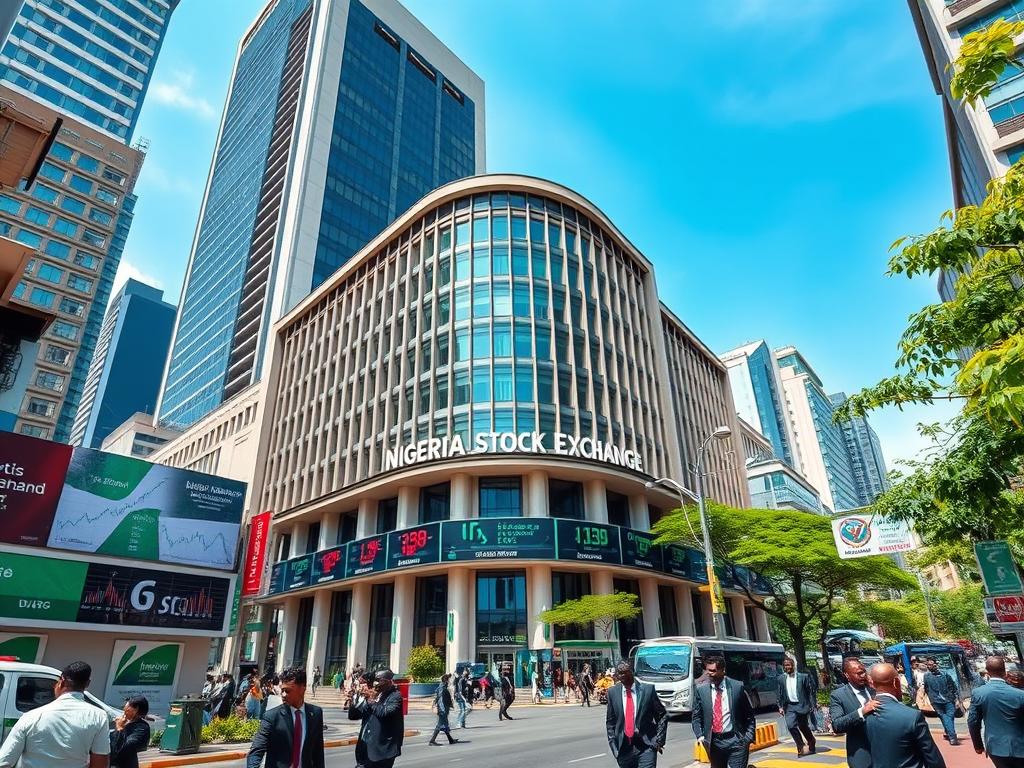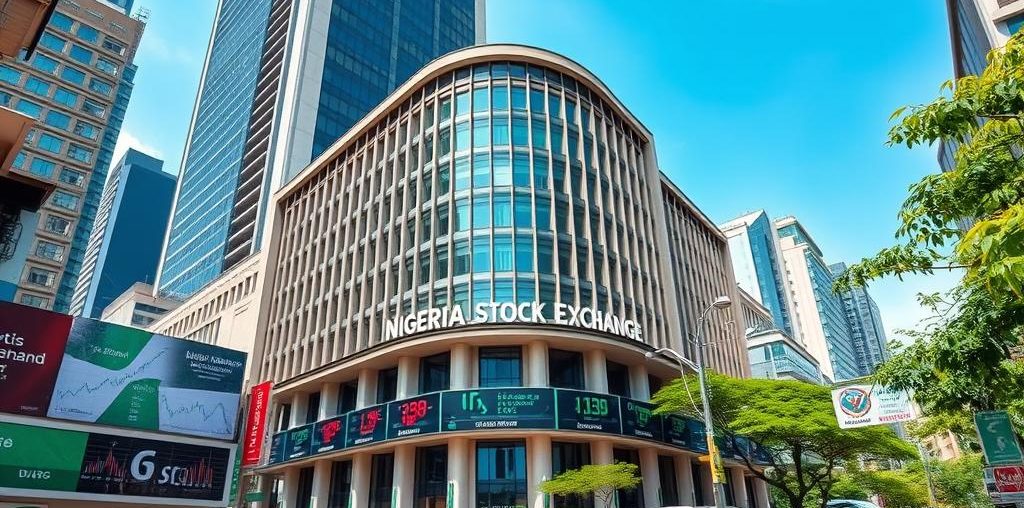The Nigeria Stock Exchange (NSE) is the top securities marketplace in Nigeria. It serves as the main entry to the country’s capital markets. As the biggest stock exchange in West Africa, the NSE is key in helping investments grow and the economy expand.

The NSE offers a place for trading Nigerian stocks, bonds, and other financial items. This lets investors join in the growth of the Nigerian economy. With over 60 years of history, the exchange has grown to meet Nigeria’s financial needs. It’s now a crucial part of the country’s financial setup.
What is the Nigeria Stock Exchange?
The Nigeria Stock Exchange (NSE) is key to Nigeria’s financial scene. It’s a place where people invest and grow capital. Since 1960, it has been based in Lagos, offering a space for trading stocks, bonds, and more.
Overview and History
The NSE started in 1961 with 19 securities. Today, it’s a major player in Africa, with over $40 billion in market value as of 2022. It has grown by adding new products and services for investors and companies.
Role in Nigeria’s Financial Landscape
The NSE is crucial for Nigeria’s economy. It helps businesses get the capital they need. It connects investors with opportunities in Nigeria, supporting the country’s growth.
| Key Facts about the Nigeria Stock Exchange | Details |
|---|---|
| Establishment | 1960 |
| Headquarters | Lagos, Nigeria |
| Market Capitalization (2022) | Over $40 billion |
| Number of Listed Companies | Over 160 |
| Main Index | Nigerian All Share Index (NSE ASI) |
Driving Economic Growth: The Vital Role of the Nigerian Stock Exchange
The Nigerian Stock Exchange (NSE) plays a crucial role in capital formation, investment opportunities, and economic development in Nigeria. It enables companies to raise funds for expansion, innovation, and operations, while providing investors a platform to create wealth and diversify their portfolios.
Over the years, the NSE has evolved into a well-regulated and sophisticated market, attracting both local and international investors. Key reforms, including the demutualization of the exchange and the adoption of advanced electronic trading systems, have boosted its competitiveness and solidified its position as a leading player in Africa’s financial markets. Despite challenges like market volatility, economic fluctuations, and regulatory hurdles, the NSE continues to show resilience and strong growth potential. Its focus on transparency, good governance, and investor protection has helped build trust and confidence in Nigeria’s financial markets.
As Nigeria works to diversify its economy and attract more foreign direct investment, the NSE remains pivotal in driving these economic goals. It promotes sustainable economic growth by offering a reliable marketplace for trading securities and supporting the broader financial ecosystem. Ongoing reforms and technological advancements further strengthen the NSE’s role as a key driver of Nigeria’s long-term economic success. With Nigeria strengthening its financial institutions and regulatory framework, the NSE will play an even more significant role in shaping the country’s economic future. Ultimately, the Nigerian Stock Exchange remains a vital force in Nigeria’s journey toward sustainable financial growth and development.

Nigeria Stock Exchange: A Platform for Investment
The Nigeria Stock Exchange (NSE) is a key place for investors to find a wide range of Nigerian equities. Companies from different fields can list their shares here. This gives them a chance to get capital and lets investors join in Nigeria’s growth.
This exchange makes it easy for people to trade these securities. Investors can buy and sell stocks based on their plans and the market.
Equity Listings and Trading
The NSE is very important for investment banking and equity listings in Nigeria. It offers a fair and open place for companies to raise money. At the same time, it gives investors a chance to make their portfolios more diverse.
Trading on the NSE happens through approved stockbrokers. This makes sure prices are found efficiently and there’s enough liquidity for the securities.
| Market Capitalization | Number of Listed Companies | Average Daily Trading Volume |
|---|---|---|
| ₦21.78 trillion | 161 | ₦5.78 billion |
The table shows some important stats about the Nigeria Stock Exchange. It highlights its big size and the busy stock trading on the platform.
The NSE is a crucial link for Nigerian equities. It connects companies looking for money with investors wanting to grow with Nigeria. Its work in investment banking and equity listings helps Nigeria’s financial scene grow.

Navigating the Nigeria Stock Exchange
The Nigeria Stock Exchange (NSE) is a key place for investors to dive into the country’s financial markets. It has many market indices and sectors. These give insights into how well Nigerian stocks are doing.
Market Indices and Sectors
The NSE uses the NSE All-Share Index to show how the market is doing. This index tracks stocks from many industries. It helps investors see how the market is moving.
The exchange also has specific indices for different sectors. For example, there’s the NSE Banking Index and the NSE Oil & Gas Index. These let investors see how each sector is doing.
Brokerage Firms and Intermediaries
To trade on the NSE, investors need to work with licensed firms. These firms help with buying and selling stocks. They also give advice and research to help investors make smart choices.
With the help of these firms, investors can feel more confident. They can make choices that fit their investment goals.
| Key Market Indices | Sector Representation |
|---|---|
| NSE All-Share Index | Banking, Consumer Goods, Oil & Gas |
| NSE Banking Index | Commercial Banks, Microfinance Banks |
| NSE Consumer Goods Index | Food, Beverages, Tobacco |
| NSE Oil & Gas Index | Integrated Oil & Gas, Exploration & Production |

Knowing about market indices and brokerage firms helps investors. It lets them make choices that match their goals. Understanding the NSE and its helpers is key for those wanting to invest in Nigeria’s markets.
The Nigeria Stock Exchange and Capital Formation
The Nigeria Stock Exchange (NSE) is key in the country’s capital formation. It lets companies raise funds by issuing shares and securities. This helps businesses grow and expand, boosting the economy and supporting key industries.
The NSE’s role in capital formation is vital for Nigeria’s securities exchange and investment banking ecosystem. When companies list their shares, they reach more investors. This brings in funds for growth, innovation, and job creation.
The NSE helps allocate capital efficiently, strengthening Nigeria’s financial structure. As more companies and investors join, the NSE becomes a major player in Nigeria’s capital markets. This supports the nation’s economic growth and prosperity.


